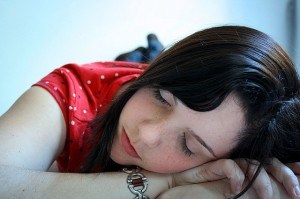
Teens and zzzs: Inadequate sleep can impact performance in the classroom
August 07, 2012 - 11:45 AM
Teenagers who fail to get enough sleep could find there's a trickle-down effect from the bedroom into the classroom.
Inadequate sleep, the effect on the brain and the resulting behaviour of adolescents was in focus at the annual meeting of the Associated Professional Sleep Societies in June. The presentation was led by neuropsychologist Dean Beebe, whose research explores the impact of sleep restriction on teens.
Part of his study involves a simulated classroom and having kids watch educational videos while rested and while sleep-deprived. They were also quizzed afterwards and had their behaviour filmed.
While there are individual differences, Beebe said, as a group, researchers observed much better attention and mood when kids are well-rested versus when they're sleep-restricted.
"We see poorer attention on computerized tasks and we see less attentive behaviours in this simulated classroom. And the fallout from that is quizzes that we give at the end, there's a significant difference in performance on those as well," said Beebe.
"And again, we're not comparing Johnny to Billy; we're comparing Johnny in one condition to Johnny in another condition."
Beebe said the average sleep duration for teens on school nights is around seven hours, while clinical recommendations are at about nine hours.
For older children who stay up later on weekends and have earlier bedtimes during the week, the transition represents a "really hard time shift," said registered occupational therapist Jennifer Garden.
"It's like flying to Toronto from Vancouver and then coming back to Vancouver two days later," said Garden, founder of Vancouver-based Sleepdreams, which specializes in sleep consultations for children.
"If you're going to bed at 11 one night, and then 11 the next night, and then you've got to get to bed for 8 because you've got to get up earlier, that really sends your circadian rhythms — and your body — into a bit of a tailspin," she said. "It's really, really tough for those kids."
Beebe, associate professor of pediatrics at Cincinnati Children's Hospital Medical Center and the University of Cincinnati College of Medicine, said biology does appear to play a factor in sleep.
A person's circadian rhythm — driven by the body's biological clock — does tend to trend later in adolescence than in younger childhood.
"In addition to that, we just live in a society where the opportunities and the pressures to stay up later are fundamentally different than they were even a decade ago," he said.
The wealth of entertainment and communications options available to kids, compounded with juggling after-school activities and hours of homework, combine to push bedtimes later, he noted.
Still, Beebe said it's important that parents enforce set bedtimes and have a wind-down period during the evenings when screens are being turned off. He also said parents should be mindful of how much caffeine their kids are consuming.
"Generally speaking, it's not a good idea to have much caffeine past lunchtime; and even at lunchtime, you should probably not be having those multiple energy drinks."
News from © The Canadian Press, 2012